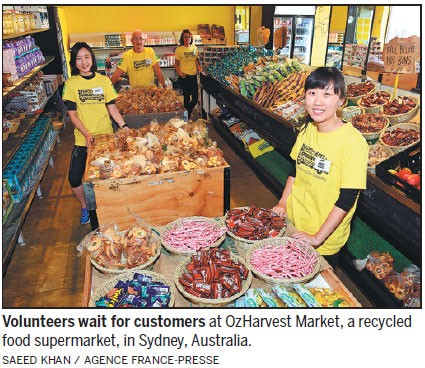Shots fired in Australia's war on waste
(China Daily) Updated: 2017-06-19 07:07SYDNEY - Australia's first recycled supermarket is giving food destined for landfills a second chance, as the government embarks on a major push to cut down on waste costing the economy A$20 billion ($15 billion) a year.
The outlet run by food rescue organization OzHarvest in Sydney takes surplus products normally thrown out by major supermarkets, airlines and other suppliers, and gives them away for free.
It is an attempt to tackle the mounting waste problem in Australia, home to 24 million people, where consumers toss out some 20 percent of food they buy with more than 4 million tons ending up as rubbish each year.

"It is simply remarkable that in prosperous, modern-day Australia we produce enough food to feed 60 million people a year but every month more than 600,000 people - one-third of them children - seek food relief from relevant charities," Environment Minister Josh Frydenberg said in April.
The government is drawing up an ambitious plan to halve food waste by 2030 and is convening a national summit later this year involving the private sector and nonprofit organizations.
Globally, one-third of food produced for humans - about 1.3 billion tonnes costing around US$1 trillion - is lost or wasted annually, according to the Food and Agriculture Organization (FAO).
Such wastage is particularly conspicuous in retail, where "large quantities" of food are thrown away "due to quality standards that over-emphasise appearance", the UN body added.
That's where supermarkets like OzHarvest come in, said founder Ronni Kahn, a leading voice in Australia's food rescue community, who hopes the pop-up store will raise awareness about sustainable living.
Besides the needy, "there are people (at the supermarket) who want to take part in this sharing economy ... taking produce and understanding why this produce was rejected, why is this here, why is this surplus", she said as she pointed to bread donated by a bakery.
Long lines have formed outside the shop since it opened in late April, with the unemployed, single mothers and students among those who leave with bulging bags of groceries.
What we eat or throw away is just the tip of the iceberg in the production process, conservation experts say, with huge amounts of resources such as fertilizers, fuel, land and water used to grow and package food.
"When food's wasted, and all of those resources are wasted as well, what's incumbent upon us is to make the most of the food that we produce in those instances, rather than producing more and more," said Marcus Godinho of charity FareShare.
Agence France-Presse
- 'Cooperation is complementary'
- Worldwide manhunt nets 50th fugitive
- China-Japan meet seeks cooperation
- Agency ensuring natural gas supply
- Global manhunt sees China catch its 50th fugitive
- Call for 'Red Boat Spirit' a noble goal, official says
- China 'open to world' of foreign talent
- Free trade studies agreed on as Li meets with Canadian PM Trudeau
- Emojis on austerity rules from top anti-graft authority go viral
- Xi: All aboard internet express











